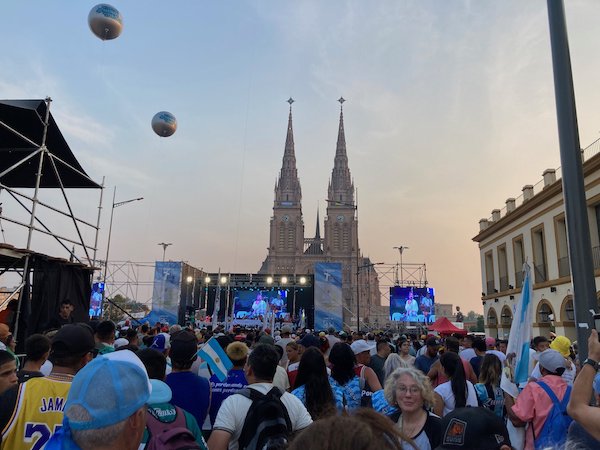
By David Agren
LUJÁN, Argentina (OSV News) — Argentine Catholics marked the 10 years of Pope Francis’ election by celebrating Mass March 12, giving thanks for the papacy of the prelate they previously knew as Cardinal Jorge Mario Bergoglio, the archbishop of Buenos Aires whose pastoral work put a priority on the poor and those on the peripheries.
Mass celebrant Cardinal Mario Poli, who succeeded Pope Francis in Buenos Aires, led prayers for the pope.
“On this latest anniversary of his election, we fervently join the entire church in praying for Pope Francis and we wish to renew our fidelity to the one who carries over his shoulders as the good shepherd the universal community of faithful,” he said.
“The church (in) Argentina expresses great joy for the singular affective bond that unites us to the vicar of Christ, who was our Cardinal Bergoglio for more than 15 years,” the cardinal said.
Pope Francis was elected March 13, 2013, becoming the first pope born in the Americas and first non-European pontiff in nearly 1,300 years.
While archbishop of Buenos Aires between 1998 and 2013, he was known for his austerity and unassuming style: riding the subway, eschewing social invitations and ministering in shantytowns. He also spoke out against corruption — so angering the then-president at the time of his election, Cristina Fernández de Kirchner, that she and her partisans were slow to congratulate him upon being elected.
Pope Francis said at the time of his election that the cardinals in the conclave had “come almost to the ends of the earth” to find him.
“At that time, the feelings for Argentines were a mix of pride and joy: a man formed in our country, who became the universal leader, the most important in the church,” Father Maximo Jurcinovic, spokesman for the Argentine bishops’ conference, told OSV News.
Many Argentines still feel enormous pride in the pope being from their country, Father Jurcinovic said.
But there has been controversy in the country, which has been deeply divided politically and where all sides have wanted to claim Pope Francis as one of their own. The bishops have had to urge people to listen to the pope’s own words rather than purported spokespersons — some of whom are longtime friends of the former cardinal or commentators interpreting papal statements and visits to the Vatican by Argentines.
“There is a group, I think a minority and unfortunately highly influenced by some media outlets, that have wanted in some way to directly overlap and diminish the figure of the pope, saying things that he never said, inventing phrases taken out of context,” Father Jurcinovic said.
“He’s with the needy people so the big media outlets speak badly of him,” said Yolanda Mendez, a teacher attending a March 11 Mass in Luján marking both the 10th anniversary of the pope’s election and the 15th anniversary for a program of Catholic drug rehabilitation centers.
The rehabilitation centers are nationally known and were started by priests known as “curas villeros” (shantytown priests), who have been backed by Pope Francis.
The Argentine church is known for its work on social issues in a country with inflation north of 90 percent and where 43.1% of the country is considered poor, according to the Social Debt Observatory at the Argentine Catholic University.
But observers are less certain of its overall influence under Pope Francis, pointing to a law decriminalizing abortion that was approved in December 2020 over strong Catholic objections.
“We have a more secular society,” Sergio Berensztein, a political analyst, told OSV News, which he said doesn’t mean life conditions are much better. “You still have this number of (Catholic) people working in the worst conditions” such as the shantytowns, he added.
Pope Francis has yet to visit Argentina since being elected pope, causing some confusion in the South American country. Analysts say he likely wants to avoid being used politically.
Cardinal Poli said in his homily the pope has preferred to visit countries where “the Catholic community is a minority and Christianity faces intolerance and evangelization faces more than a few challenges.”
In a March 10 interview with the Argentine newspaper La Nación, Pope Francis expressed a desire to visit.
“I will gladly go but think a little of the things that you have to do so that the country can move forward,” he said. “The country’s salvation is not going to come from my trip.”
